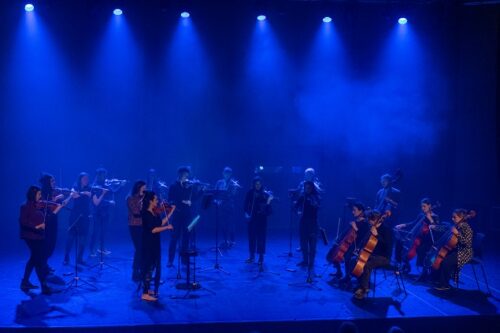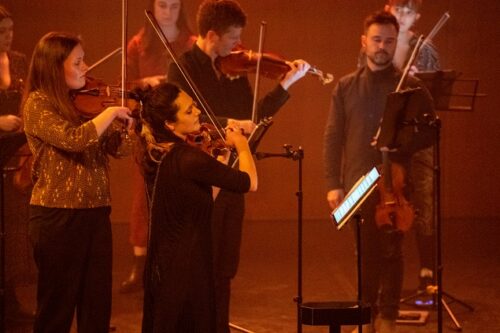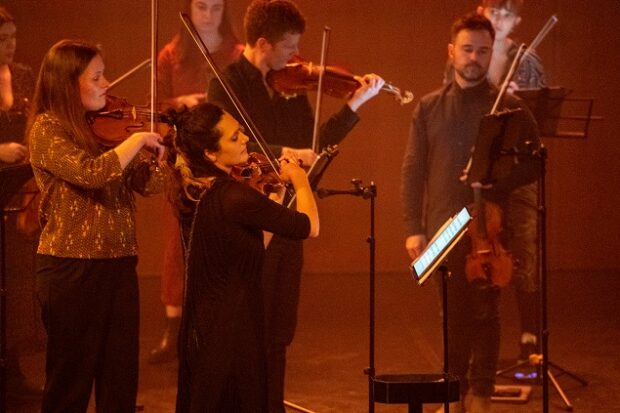 United Kingdom Manchester Collective’s Places We Know: Manchester Collective / Rakhi Singh (violin/director). Purcell Room, Southbank Centre, 4.12.2022. (CC)
United Kingdom Manchester Collective’s Places We Know: Manchester Collective / Rakhi Singh (violin/director). Purcell Room, Southbank Centre, 4.12.2022. (CC)

Missy Mazzoli – You Know Me From Here (2012)
Oliver Leith – will o’ wisp (2022)
Caroline Shaw – Plan & Elevation (2015)
Shostakovich – Chamber Symphony in C minor, Op.110a (1960)
The Manchester Collective continues to be a beacon in dark times, a light that others should follow. Their programmes always seem perfectly judged, and this was no exception. Talking of lights, the actual colours we saw the ensemble drenched in was a real part of the experience – every aspect is thought through, even to the mist/dry ice.
Missy Mazzoli’s You Know Me From Here was commissioned by Carol Cole for the Kronos Quartet. Mazzoli imagines a journey homeward, encompassing a ‘trek through chaos’ (the first movement, ‘Lift Your Fists’) and loneliness (‘Everything That Rises Must Converge’) to a place of serenity (‘You Know Me From Here’). Mazzoli’s take on loss is an optimistic one; it is a shedding of what we no longer need. Mazzoli’s work buzzes with energy, shards of chords. Slick gestures sit next to exuberant ones, but through all of this runs a strain of lyricism, something that can certainly be found in another Mazzoli work, This World Within Me. A special word for the cello solos of Christian Elliott perhaps in this piece, so expressive, so perfectly judged. The performance of Mazzoli’s You Know Me From Here was impressive on an emotional level but also on a technical one – this was so disciplined. Incredibly powerful, often poignant music, beautifully performed.

London-based Oliver Leith is a composer and artist based in London. His will o’ wisp (2022) is listed on Faber Music’s website but seemingly not on the composer’s own; it is for string ensemble, including double bass with low C extension. It was co-commissioned by the Manchester Collective and the Norwegian Chamber Orchestra and received its world premiere just days before this account, with the Manchester Collective and Rakhi Singh at Manchester’s Royal Northern College of Music. Leith has said of the piece that, ‘will o wisp is me attempting to grapple with something to do with Englishness. It uses an old English-Irish-Scottish folk theme; nobody quite knows where it’s from. The piece sort of tears it apart and it’s as if it has been left in a vat of something for a long period. It should be both rather beautiful and scary.’ It is as if listening to music in another dimension – Leith has a unique voice and his music easily encompasses the evocation of the liminal and, in the third movement, a folksy jig. Even the movement titles are elusive: ‘boom push fairy spook’; ‘rot spook’; ‘magic’; ‘not face’. Quiet music, sometimes suffused with trills; in the final movement, a solo violin (the excellent Singh) takes on what sounds like a fully independent voice. Incredible how the Manchester Collective could programme two such different, yet complementary pieces. A fully satisfying first half.
The music of Caroline Shaw has been gaining a lot of traction recently. I thoroughly enjoyed her piece Thousandth Orange played by the Trio Klein in Clerkenwell (with pianist Huw Watkins) in 2021; the present piece, plan & elevation, was commissioned by Dumbarton Oaks to celebrate its 75th anniversary (the famous estate immortalised by Stravinsky). It was premiered in 2015 in its quartet version, but listening to it on quartet, one is aware of almost an ambition for the music to burst its seams in the first movement, ‘The Ellipse’. This is Shaw appreciating the estate from outside; as she was inaugural music fellow at Dumbarton Oaks 2014/15, she knows the place well. There is a minimalist aspect to the first movement, harmonically as well as motivically, coupled with a really poignant sense of nostalgia; the second movement, ‘the cutting garden’, waves in quotes from Ravel, Mozart (K 387) and Shaw’s own Entr’acte, Valencia, and Punctum; I hear Janáček in the mix, too. ‘The Herbaceous Border’ offers a place of emotional freezing that slowly melts, before the penultimate ‘The Orangery’, a fascinating musical representation of fractured shadows, the performance here so well coordinated and poignant, leading to the final ’The Beech Tree’, a representation of Shaw’s favourite stop in the garden, presented as timeless, the unfolding melodies set against glass-like, super-high violin pizzicatos. The sonic imagination here is vast, and it is impossible to imagine a more committed performance than this.
Finally, Shostakovich’s Chamber Symphony, based on his Eighth String Quartet. We have already encountered a composer quoting themselves; here we find it writ large, with, for example, an absolutely unmissable quote from the First Cello Concerto. A piece born of troubled times; it seems highly relevant right now. From the monolithic cadential arrivals of the first movement to the sheer frenzy of the second, the Manchester Collective presented a piece of unutterable emotional honesty, a whirligig of death, sometimes fierce, sometimes frighteningly shadowy (the Allegretto third movement). The fourth movement Largo moved with the slow inevitability of lava; the finale, another Largo, moved with the weight of the world on its shoulders. An astonishing performance of an amazing work.
The Places We Know tour continues on December 10 at Leeds (The Holbeck) and then on the 11th at Liverpool’s Tung Auditorium. (Please note the event at Saffron Walden’s Saffron Hall on December 9 has been cancelled).
Colin Clarke
